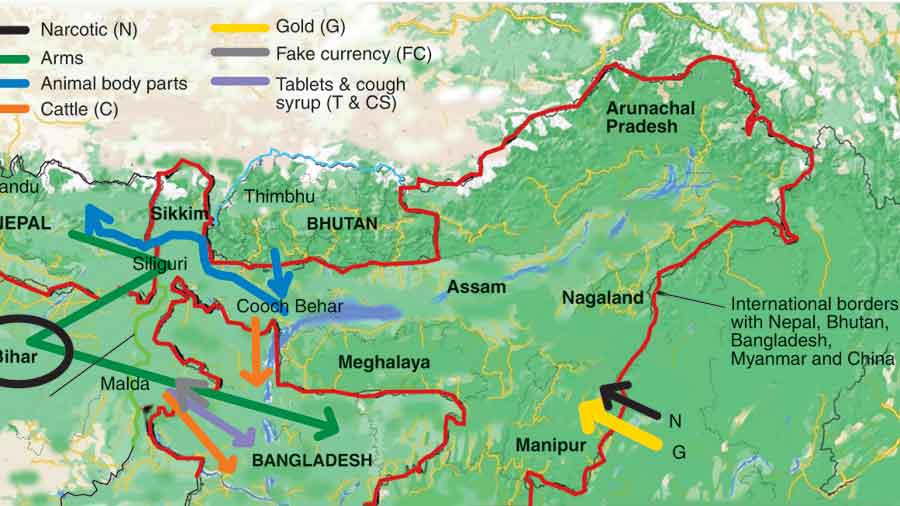The operatives engaged in smuggling of various items across north Bengal and Northeast, which share borders with Bangladesh, Nepal, Bhutan, Myanmar and China, have begun using barter system to carry on with their illegal trade at a time delivering cash on receipt of consignments has become difficult because of a host of factors.
A senior BSF officer posted in Malda district said the force had come to know of the new modus operandi when it had intercepted some drugs consignments and arrested members of a racket that was engaged in sending illegal firearms and cough syrups to Bangladesh.
“During interrogation, it emerged that the operatives have switched to a system of bartering these days. This change has indeed made surveillance difficult,” said an officer of a central intelligence agency posted in the district.
Between north Bengal and Northeast, the BSF guards around 2,500km of the India-Bangladesh border. As the borders that India shares with Bangladesh, Nepal, Myanmar and Bhutan are porous and the areas adjoining the boundaries are densely populated, surveillance has always been a challenge as smugglers invent new ways to hoodwink security agencies.
The basket of products that are illegally traded between north Bengal and Northeast with the neighbouring countries has also been expanding and a multi-country network has developed.
“Earlier, it was cattle and fake currency which were smuggled along the India-Bangladesh border. But in recent times, the basket has expanded to include items ranging from gold to yaba tablets to cough syrups, firearms and of course, narcotics. The pandemic-induced lockdown, because of which normal border trade has suffered, may have been the reason behind the broadening of the basket and the emergence of the multi-country network,” said a source in the BSF.
During conversation with multiple sources in BSF, the SSB and other state and central agencies, it was revealed that the system of barter — an innovation that has taken the agencies by surprise — has resulted in a sudden spurt in illegal trade across multiple borders.
Researchers who have studied the new mechanism that the rackets have evolved elaborated on the issue, while underscoring the system is helping the smugglers handle less cash.
“For example, a consignment of tablets and cough syrups is sent to Bangladesh. In return, the supplier receives a consignment of narcotics (see map). He is then sending the drugs through his own channels to places like Calcutta, Bihar and even to the neighbouring country of Nepal and in return, obtains some other items which are smuggled out to Bangladesh. This is how this system is functioning. It is not that they are not handling cash, but in lesser quantities,” said Abhijnan Sengupta, a researcher in economics who is based in Malda.
He has said while transferring money to banks from anywhere in the world has become easy these days, those involved in illegal trade are aware of the hazards because of strict vigil on transactions. Sending huge amounts of cash through the Hawala channels, the researcher said, has become difficult these days and that’s why the barter system has evolved.
“Operatives in multiple countries are involved and hence, the barter system works well as there are no worries about exchanging currencies... Once the product reaches the final recipient, that person can sell it in local currency and realise the gains,” explained Sengupta.
As security agencies have learnt about the new method, they have also found that though there are certain limitations in the barter system — for example, ascertainment of prices — the smugglers have even evolved a process to overcome the problem. “There is a specific price for each of the items which they exchange illegally across the border. Messages are exchanged after each consignment is sent and calculations are done on quantities,” said an official of a central intelligence agency.
Additional reporting by Bireswar Banerjee and Avijit Sinha in Siliguri











